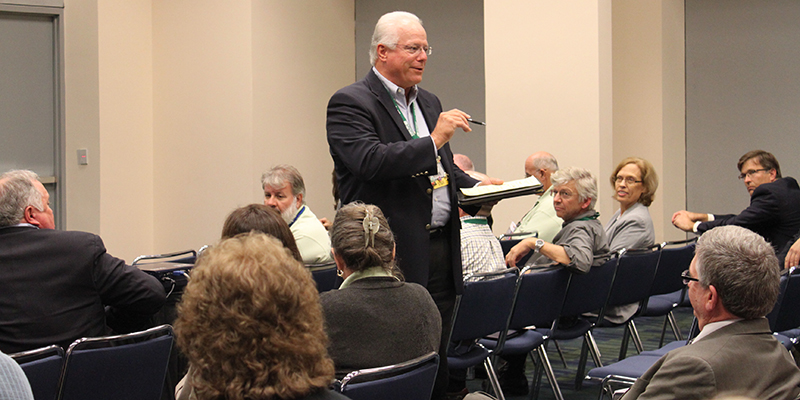
 |
| Wicker works hard to be a partner in the process with ICC Members. |
SHARE 

 |
 |
| ICC State & Local Government Relations Vice President Vaughn Wicker updates Annual Conference attendees during the Government Relations Forum. |
| If you're reading this and you're from the Southeast, there's a good chance that you've already met Vaughn Wicker; and if you've met him, there's a very good chance that you remember him: a tall, affable man whose Carolina drawl and easygoing manner belie the quick wit and serious nature that have made him so successful in the Government Relations department at ICC. As we peruse the voluminous pages of Wicker's career, two themes appear time and again — his belief in the necessity of adaptability and his true pleasure in working with people from diverse backgrounds. As a young man, he worked for a general contractor as a project manager. But with a new baby in the house, he was looking for work in a field offering better benefits. So he took his experience and love of people and applied for a vacancy in the building department in the city of Greenville, S.C., where he was hired to work under the deputy building official. His affinity for working with people was soon exercised, as his boss in the building department didn't like travel and thus selected Wicker to attend the Southern Building Code Congress International (SBCCI) conference in January of 1979. He made such an impression with his knowledge and desire to learn more from his peers across the South that Bill Tangye, the soon-to-be CEO of SBCCI and later first CEO of ICC, asked him to speak on the first code change on the agenda at the 1980 meeting, and, in his words, "they haven't been able to shut me up since." After a brief hiatus working for the Portland Cement Association as a Codes and Standards Representative, he realized that the one thing he couldn't adapt to was the isolation of a home office. A true extrovert, he longed to be with people, learning, teaching and simply conversing, and so he rejoined the city of Greenville. His philosophy of adaptability was even reflected in his favorite projects at the city, existing buildings. "I liked talking with the architects, contractors and building owners, and asking, 'what can we do to reuse these buildings?'" Wicker recalls. "I worked hard to portray the image of a building official as a partner in the process, so the code wasn't an obstruction to be overcome." His experience in Greenville led to his involvement on SBCCI codes committees, becoming a member of the South Carolina Building Code Council, and heavy involvement with the Building Officials Association of South Carolina (BOASC). Even in those days, he was out of the office as much as 85 days a year for SBCCI, the Code Council and BOASC work. When he and the city of Greenville parted ways in 1994, his work with BOASC and SBCCI committees led to the opening of a new SBCCI regional office in Greenville and his employment as regional manager. He was fortunate enough to serve as secretariat for one of the five committees that developed the International Building Code and met many code officials from across the country in the process. During the last few years leading into the merger, he met and developed a rapport with Sara Yerkes after she was hired to handle Government Relations for the newly formed International Code Council. As a result of the merger of the legacy organizations, Wicker and other member services folks in the three organizations were moved into the Government Relations department. When informed of the change, he was eager for the chance to work with now-Senior Vice President Sara Yerkes to help develop an effective field staff to respond to the challenges facing ICC at the time. Now, he still spends time doing what he loves — working with people. When ICC formed its membership councils and asked they be staffed by Government Relations, he was asked to serve as a staff liaison to one of the Councils. "I thoroughly enjoy being the staff liaison to the Building Officials Membership Council," he explains. "I think it's something our members need to know more about and to participate in, because that's where members from all over the country can come together and raise issues that concern all of the ICC membership — not to mention learn about new approaches and network with peers they might not otherwise meet." Wrapping up the interview, I ask Wicker if he has any final thoughts. He pauses, considering what he wants to say. "As I work toward retirement in two to three years, I thoroughly enjoy working for an organization whose staff is so dedicated to meeting the needs of its members," he says, smiling. "I'm extremely fortunate to have a more interactive experience with our members than the majority of our staff. Our members are dedicated and passionate professionals who are very often underappreciated for the services they provide, and I am blessed to have met and developed friendships with so many of our staff and members." |